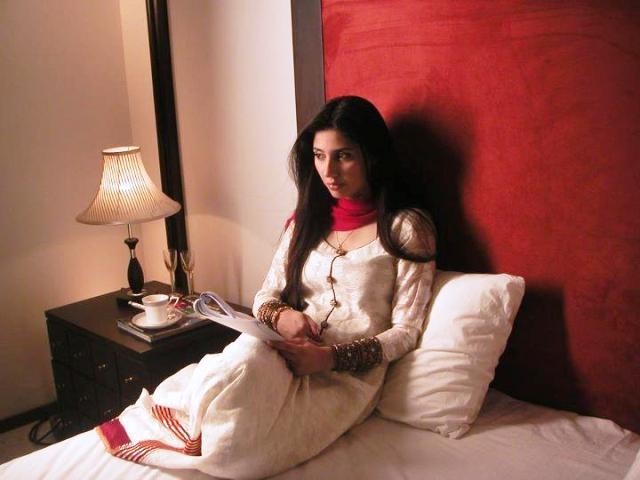Ashar stares at his love interest with desire that would give school girl goose bumps. PHOTO: PUBLICITY
The appeal of Humsafar is obvious. You could cut through the weird chemistry between Khirad and Ashar, the hero authors of romance novels would be envious of. Eye candy, nakedly sexual, he stares arduously at his love interest with desire that would give the Grammarian and the Aisha Bawany schoolgirl goose bumps. He is clean cut. He smiles infrequently and when he does, it seems as if it were a gift. Physical contact is at a minimum. Sex is implied, and there is a chastity reminiscent of Zia-era dramas that drives people insane with tension.
Khirad on the other hand, played by the cherubic Mahira with bright makeup, and translucent skin, appears surprisingly asexual — the recipient of the man’s desire, derision, and disdain – not interfering too much with the screen appeal of Ashar, with nice beauty, but insipid enough to not be threatening to female viewers. She is also surprisingly silent, when all you want is for her to sit him down and feverishly explain the terrible misunderstanding the entire infuriating play is constructed on, over a cup of coffee or a glass of vodka.
If Khirad’s father taught her such great values, why was her marriage into an affluent family (mild protestations notwithstanding) and its inevitable accompaniments – an abusive mother-in-law, and a passive aggressive unpredictable husband — the only way to material security?
Her mind that works faster than a calculator could also have landed her a PhD stipend at the University of Punjab where she could have raised her daughter modestly, but well. If not, then perhaps a junior analyst position at Engro where she would have adequate medical coverage for her child. And if not that, there could be situations around inflation and lack of opportunities. Eventually, she could have met a man less verbally challenged than Ashar and they would have actual conversations instead of old words reverberating in their heads like bipolar memories. In fact, what Khirad’s father taught her was the hegemonic values – where honesty is inextricably entwined with being a good wife and a submissive, self-denying woman whose moral sexuality is her ticket to livelihood.
The house is central to the play. It is luxurious. It has a swimming pool (virginal) in the background, and tasteful art. It is sterile, hotel-like, and it’s the woman’s object of ultimate attainment. Khirad got thrown out, and in a scene that played cruelly on all women’s insecurities, we are shown that what capitalist patriarchy giveth, it taketh if you can’t abide by bourgeois society’s moral ethics. Underlining Khirad’s dramatic eviction from the house is the fact that she did abide by these ethics and is of unblemished character. It is she of moral purity who deserves the house rather than the manipulative mother-in-law.
In an earlier episode, it is the mother-in-law who is threatened with eviction if she does not agree with her husband’s decision to respect his dying sister’s wish. But the mother-in-law’s non-nuanced evil aside, isn’t it troubling that women despite age, motherhood and having maintained homes are always on the verge of losing it all — always at the whim of later apologetic, yet unapologetic men? Sadly, after this they have to rely on puppeteering their sons for personal fulfillment. Note that the mother-in-law has a possibly satisfying career in an NGO – but this worldly fulfillment fades in comparison to the infinite delights of tormenting her child.
If Khirad had not submitted happily to Ashar’s gradual advances, and had asserted sexual autonomy or indifference, then what? When she does give up on him, it is because he is weak and could not protect her. But imagine a Khirad who is coming of age and is actually exploring multiple, conflicting sexual emotions towards her cousin-husband and maybe even her classmate, and later, raising her child as a single mother and meeting a man of her choice? But this would, of course, mean complexity and a screenplay that does not rely on overly simplistic archetypes. Functioning within the confines of patriarchy, Khirad cannot lose her chance of reunion with Ashar by responding to any other man in her four and a half years as a single woman. Playing on scenes in Bollywood, where the woman’s purity is depicted through devoted, childlike prayer as the male voyeurs, here too in Episode 19, Ashar is shown after Khirad has vulnerably bared it all before her God.
Ashar, too, stays pure. But promiscuity will not cost him a home. His celibacy (and virtual impotency) is affirmation of his unattainability. No wafer (think vamp) like Sara sink her claws in him. Sara’s character, again, is monosyllabic evil. And the fact that she runs the show at corporate HQ when Ashar is in the doldrums is not commendable, but rather evidence of her manipulative abilities. That she uses yoga to keep herself grounded in her evil designs is yet again weird social commentary as is her always western attire. And since the drama is PG, we never see Ashar succumbing to Sara’s advances (though it would add a twist and a moral dilemma) despite being in hotels together and constantly in each other’s homes.
The terrible appeal of Humsafar is that it confirms characters and stories set in deeply patriarchal frameworks. It is sexist justice that soothes the hearts of patriarchal vigilantes, and keeps us on because we want to see the mother-in-law shamed, humiliated and thrust out, and moral purity rise to the top in the reunion of Khirad and Ashar.
It is a modern day fairy tale, better than Cinderella, worse than Shrek; the born again revival of TV drama in a tweeting world.




 5:20 AM
5:20 AM
 US A MA
US A MA























